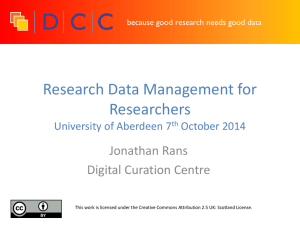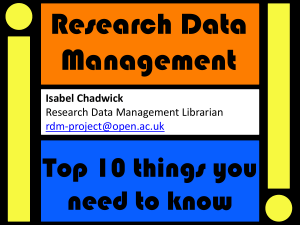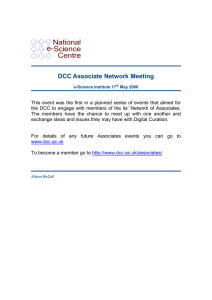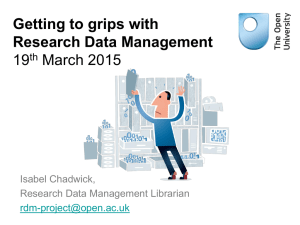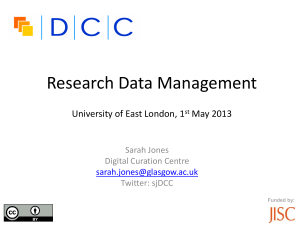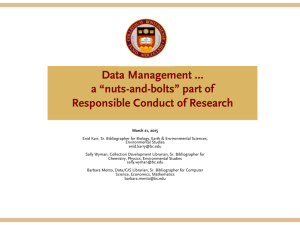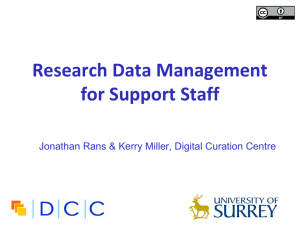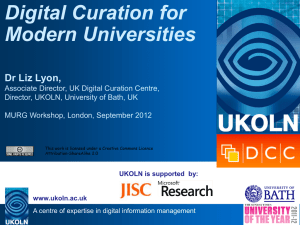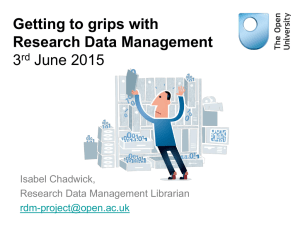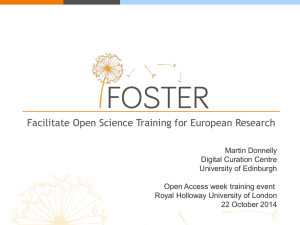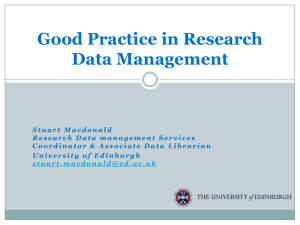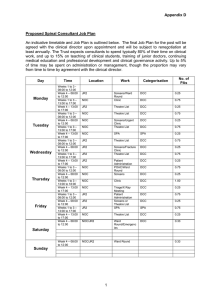Research data management is an explicit process covering the
advertisement
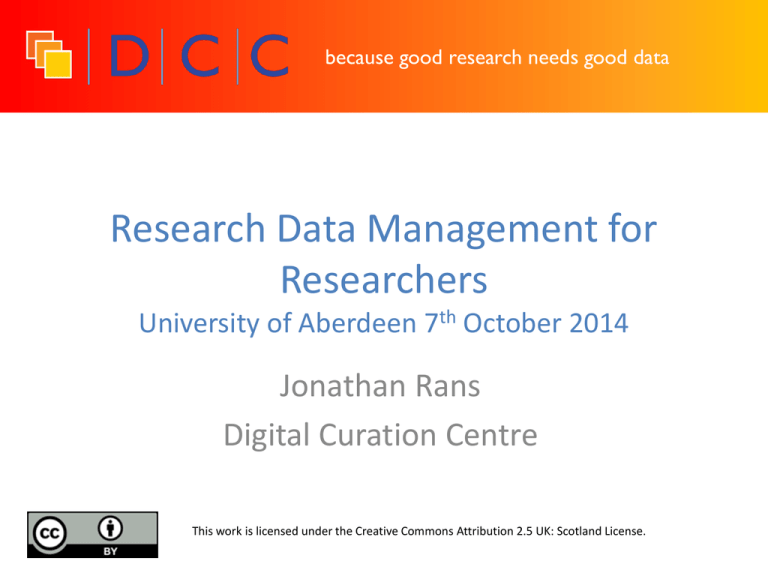
because good research needs good data Research Data Management for Researchers University of Aberdeen 7th October 2014 Jonathan Rans Digital Curation Centre This work is licensed under the Creative Commons Attribution 2.5 UK: Scotland License. What will we cover? 1. Definitions that we work to 2. What does the EPSRC expect of you and your institution? 3. How can these requirements be satisfied and how are other institutions addressing them? Who we are The (Est. 2004) is: » A national-level centre of expertise in digital preservation with a particular focus on Research Data Management (RDM) » Based across three sites – Edinburgh, Glasgow and Bath » Working closely with a number of UK institutions to boost RDM capability across the HE sector » Also involved in a variety of national and international collaborations Definition of research data “Research data is defined as recorded factual material commonly retained by and accepted in the scientific community as necessary to validate research findings; although the majority of such data is created in digital format, all research data is included irrespective of the format in which it is created.“ So, what might this include? http://www.aoml.noaa.gov/phod/dac/array_growth.html http://www.sbirc.ed.ac.uk/documents/lbc_protocol.pdf Anything & everything produced in the course of research http://www.aoml.noaa.gov/phod/graphics/dacdata/globpop.gif What is research data management? Research data management is an explicit process covering the creation and stewardship of research materials to enable their use for as long as they retain value. - A. Whyte and J. Rans DCC DCC lifecycle model A simplified data lifecycle Data Management Planning Creation Discover and Reuse Use Appraisal and Deposit and Publication Deposit Publish Discovery and Reuse Plan Create Use Appraise EPSRC Principles 1. As freely and openly available as possible 2. Acknowledges constraints on data release 3. Use of datasets should be properly acknowledged 4. Limited period of privileged access 5. Data Management Plans required, preservation of long-term data is required 6. Appropriate metadata should be made openly available 7. It is appropriate to use public funds to support preservation and management of data The role of the institution “The modern data-rich environment for research and learning and the open culture that is needed to exploit it presents new challenges for Universities… creating a setting that will encourage researchers to adapt their ways of working and… implementing strategies to manage the knowledge that they create.” Science as an open enterprise - The Royal Society 2012 p.71 Components of an RDM service http://www.dcc.ac.uk/resources/how-guides/how-develop-rdm-services Institutions investing in managed storage for active data are making substantial amounts available free 5 TB 1 TB Institutional collaborative platforms 0.5 TB What is best practice for handling files? » Adopt file naming conventions: » http://www.jiscdigitalmedia.ac.uk/guide/choosing-a-file-name/ » Design a good project folder structure » http://research-data-toolkit.herts.ac.uk/document/research-projectfile-plan How can I share sensitive data? » http://www.data-archive.ac.uk/create-manage/consentethics/anonymisation » http://www.data-archive.ac.uk/create-manage/consentethics/consent What support is there for data cleaning? Labtrove Online lab-book system Adapted blogging platform Links to instrument data Allows data publication and sharing Used by the Roslin Institute Training materials » http://datalib.edina.ac.uk/mantra/ » http://www.jorum.ac.uk/ What help is there with data protection issues? » Institutional FOI and IP advice » http://www.dcc.ac.uk/resources/how-guides/license-research-data http://libraryblogs.is.ed.ac.uk/blog/2013/12/06/the-four-quadrants-of-research-datacuration-systems/ What metadata should be captured? » Minimum » http://data.bris.ac.uk/2012/05/18/minimal-set-of-mandatorymetadata/ » Discovery » Readme file content http://data.research.cornell.edu/content/readme » Use » Data Documentation Initiative http://www.ddialliance.org/ » DCC Metadata Catalogue http://www.dcc.ac.uk/resources/metadata-standards Do I need to archive non-digital data? How can I make data citable and get credit for sharing it? » Digital objects must have an associated DOI » http://www.dcc.ac.uk/resources/how-guides/cite-datasets Orcid profiles can integrate with institutional infrastructure » http://orcid.org/organizations/institutions What if I want to host my own data? » Making the case for preserving a live database » http://www.dcc.ac.uk/resources/developing-rdmservices/dmps-arts-and-humanities » Using an institutional repository as a back-end » http://www.dcc.ac.uk/resources/developing-rdmservices/repository-radar How do I cost my RDM activities? » 4C project » http://www.4cproject.eu/ » UKDA costing tool » http://www.dataarchive.ac.uk/media/247429/costingtool.pdf Thank-you! Jonathan Rans J.Rans@ed.ac.uk @JNRans Image Credits 4 Quadrants of research data: Stuart Lewis, Edinburgh University, http://dx.doi.org/10.6084/m9.figshare.873617 Labtrove - Milsted AJ, Hale JR, Frey JG, Neylon C (2013) LabTrove: A Lightweight, Web Based, Laboratory “Blog” as a Route towards a Marked Up Record of Work in a Bioscience Research Laboratory. PLoS ONE 8(7): e67460. doi:10.1371/journal.pone.0067460 Metadata devil: http://www.truthdig.com/cartoon/item/nsa_its_just_metadata_20130812
